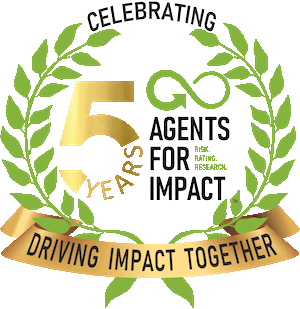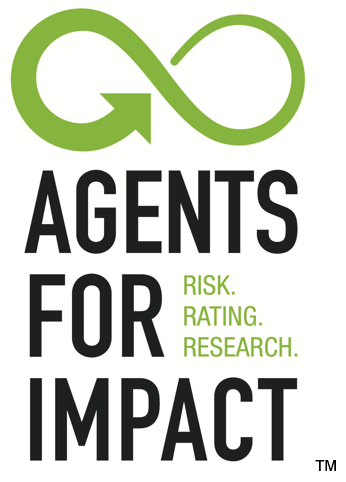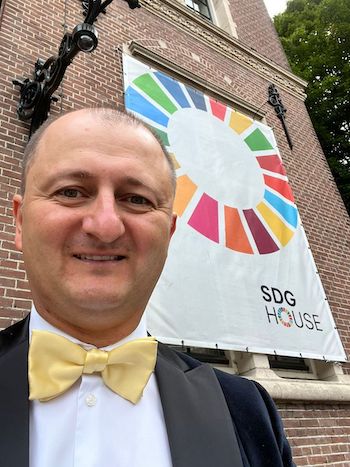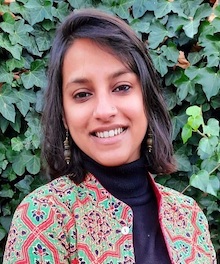 In the context of agricultural lending in Cambodia, Dr Caballero-Montes assesses the extent to which microfinance institutions (MFIs) are able to pursue both financial and social objectives. The author contends that
In the context of agricultural lending in Cambodia, Dr Caballero-Montes assesses the extent to which microfinance institutions (MFIs) are able to pursue both financial and social objectives. The author contends that
Search Results for: measure
SPECIAL REPORT: Agents for Impact – We Make Positive Impact Investable!
 Founded in 2018, Agents for Impact (AFI) celebrates its fifth anniversary this year. This represents five years of continuous commitment to our mission, which is to build bridges between impact investors and financial services providers in developing markets across the world. Sustainability is central to our vision. We aim to create more investment opportunities by measuring risks (Risk), rendering impact measurable and comparable (Rating), and making sustainability and financial inclusion understandable for investors (Research).
Founded in 2018, Agents for Impact (AFI) celebrates its fifth anniversary this year. This represents five years of continuous commitment to our mission, which is to build bridges between impact investors and financial services providers in developing markets across the world. Sustainability is central to our vision. We aim to create more investment opportunities by measuring risks (Risk), rendering impact measurable and comparable (Rating), and making sustainability and financial inclusion understandable for investors (Research).
To acknowledge our jubilee, we kick off 2023 by looking back at our achievements and bringing some of our milestones to your attention. Since its inception, AFI has provided investment advice and recommendations on around USD 285 million in impact investing transactions. So far, we have done business in 16 countries across the globe, facilitating debt financing to 32 financial institutions (including one more since the December 2022 figures shown in the graph below!) – each of which was analyzed and selected according to strict standards of sustainability, alignment with a number of the UN’s Sustainable Development Goals (SDGs), and
MICROCAPITAL BRIEF: WeLight Madagascar Raises $20m from EDFI ElectriFI, EIB, Triodos for Off-Grid Solar Development
 WeLight, which operates in Madagascar and Mali, recently raised EUR 19 million (USD 20 million) from the Electrification Financing Initiative (ElectriFI) of Belgium-based European Development Finance Institutions (EDFI), the EU’s European Investment Bank (EIB) and three funds managed by Netherlands-based Triodos Investment Management to build solar mini-grids in Madagascar. These commitments complete the fundraising phase of a EUR 28 million (USD 30 million) project to
WeLight, which operates in Madagascar and Mali, recently raised EUR 19 million (USD 20 million) from the Electrification Financing Initiative (ElectriFI) of Belgium-based European Development Finance Institutions (EDFI), the EU’s European Investment Bank (EIB) and three funds managed by Netherlands-based Triodos Investment Management to build solar mini-grids in Madagascar. These commitments complete the fundraising phase of a EUR 28 million (USD 30 million) project to
SPECIAL REPORT: Looking Back to Plan Ahead – The Year of AFISAR
 AFISAR© (the Agents for Impact Sustainability Alignment Rating) builds trust and credibility in the microfinance sector. With our partners, we engage in an active rating process, inspiring discussion and increasing awareness and understanding of the UN’s SDGs and environmental, social and governance (ESG) factors, taking a deep dive into the potential of finance to transform people’s lives, especially the lives of members of vulnerable groups. Placing active dialogue at the centre of the AFISAR© rating process, we address sustainability with strategic decision-makers and support our partners to further align their operations to the SDGs.
AFISAR© (the Agents for Impact Sustainability Alignment Rating) builds trust and credibility in the microfinance sector. With our partners, we engage in an active rating process, inspiring discussion and increasing awareness and understanding of the UN’s SDGs and environmental, social and governance (ESG) factors, taking a deep dive into the potential of finance to transform people’s lives, especially the lives of members of vulnerable groups. Placing active dialogue at the centre of the AFISAR© rating process, we address sustainability with strategic decision-makers and support our partners to further align their operations to the SDGs.
Having clocked five years of rating experience, culminating with the Year of AFISAR© in 2022, we would like to share some reflections:
Local presence is key Our rating team has grown bigger and stronger: we have a new colleague, Abhinav Soni, who is based in
MICROCAPITAL BRIEF: IMBE Using Finbit Technology from L-IFT to Support Child Care Providers in South Africa
 Low-income Financial Transformation (L-IFT), a Netherlands-based firm, recently entered into an agreement with South Africa’s Imbe Enterprise Incubator whereby Imbe will provide L-IFT’s Finbit financial tracking software to its clients. The goal is to reach all of Imbe’s clients, who are primarily Black women who operate creches – child care facilities – in low-income neighborhoods. Finbit helps its users
Low-income Financial Transformation (L-IFT), a Netherlands-based firm, recently entered into an agreement with South Africa’s Imbe Enterprise Incubator whereby Imbe will provide L-IFT’s Finbit financial tracking software to its clients. The goal is to reach all of Imbe’s clients, who are primarily Black women who operate creches – child care facilities – in low-income neighborhoods. Finbit helps its users
MICROCAPITAL BRIEF: Cerise+SPTF Updates Social Performance Indicators (SPI) Online Platform
 Cerise+SPTF, the joint venture of the NGOs Comité d’Echange, de Réflexion et sur les Systèmes d’Epargne-Crédit (Cerise) of France and the US-based Social Performance Task Force (SPTF), recently launched
Cerise+SPTF, the joint venture of the NGOs Comité d’Echange, de Réflexion et sur les Systèmes d’Epargne-Crédit (Cerise) of France and the US-based Social Performance Task Force (SPTF), recently launched
MICROFINANCE PAPER WRAP-UP: “Private Asset Impact Fund Report 2022;” by Anne Estoppey, Ramkumar Narayanan; Published by Tameo
 This report is derived from a survey of managers of private asset impact funds (PAIFs), which are defined as investment vehicles “that have more than 50 percent of their non-cash asset[s] allocated both to private debt or private equity instruments and to emerging and frontier markets, with a development impact bias.” The survey sample comprises
This report is derived from a survey of managers of private asset impact funds (PAIFs), which are defined as investment vehicles “that have more than 50 percent of their non-cash asset[s] allocated both to private debt or private equity instruments and to emerging and frontier markets, with a development impact bias.” The survey sample comprises
SPECIAL REPORT: Agents for Impact: Well-equipped for Future Business Development
 Agents for Impact GmbH (AFI), which acts as an intermediary between investors and the world of impact investing, successfully has won FS Invest Holding as an investor. With an eye on the long-term, as of August 2022, FS Invest took a 75-percent stake in our consulting boutique, which is focused on sustainability, impact investing and financial inclusion.
Agents for Impact GmbH (AFI), which acts as an intermediary between investors and the world of impact investing, successfully has won FS Invest Holding as an investor. With an eye on the long-term, as of August 2022, FS Invest took a 75-percent stake in our consulting boutique, which is focused on sustainability, impact investing and financial inclusion.
FS Invest is part of the Helmig family’s group of companies, which is already active in several other holdings in the financial sector, including through its ATON Group.
“We  are pleased to have an experienced investor at our side that will carry Agents for Impact into the future and enable us to expand our business,” says Dr Andrij Fetsun, AFI’s CEO (pictured).
are pleased to have an experienced investor at our side that will carry Agents for Impact into the future and enable us to expand our business,” says Dr Andrij Fetsun, AFI’s CEO (pictured).
About AFI
AFI was founded in 2018 by Dr Fetsun and Ms Edda Schröder with the purpose of: (1) increasing impact investments in emerging and developing markets by building bridges between impact investors and the world of impact investing in order to enable financial inclusion for underserved populations across the world; and (2) contributing to the UN Sustainable Development Goals (SDGs) with the help of the firm’s proprietary SDG rating system, the Agents for Impact Sustainability Alignment Rating (AFISAR©) Tool.
AFISAR© helps microfinance institutions (MFIs) leverage the growing importance of strong sustainability performance vis-à?vis international investors, particularly impact investors. The rating tool analyses an MFI’s operations (at both the institutional and portfolio levels) based on a comprehensive set of
MICROFINANCE PAPER WRAP-UP: “The Impact Radar,” Published by UN Environment Programme Finance Initiative
 The authors of this report offer a taxonomy to help measure the positive and negative impacts of the products and services of financial institutions, with the aim of enabling these institutions to build a better understanding of various elements of sustainable development. The “impact radar” includes a range of “impact areas” and constituent
The authors of this report offer a taxonomy to help measure the positive and negative impacts of the products and services of financial institutions, with the aim of enabling these institutions to build a better understanding of various elements of sustainable development. The “impact radar” includes a range of “impact areas” and constituent
SPECIAL REPORT: Agents for Impact Sustainability Alignment Rating (AFISAR©): Applying a Gender-smart Approach in the Microfinance Sector
 UN Sustainable Development Goal (SDG) 5, “Achieve Gender Equality and Empower All Women and Girls,” is not only a standalone goal but is inextricably linked to the other SDGs. Though moving toward gender equality has long been associated with achieving social or political goals, its proven economic benefits remain under-appreciated. According to the World Bank’s 2021 Global Findex Database, more than 1 billion women worldwide still lack access to the financial system. In fact, women make up the largest unbanked population in the world, with more than 70 percent of woman-owned small and medium-sized enterprises estimated to have inadequate or no access to financial services. The financial gap just for women-owned formal small businesses is estimated to be USD 300 billion.
UN Sustainable Development Goal (SDG) 5, “Achieve Gender Equality and Empower All Women and Girls,” is not only a standalone goal but is inextricably linked to the other SDGs. Though moving toward gender equality has long been associated with achieving social or political goals, its proven economic benefits remain under-appreciated. According to the World Bank’s 2021 Global Findex Database, more than 1 billion women worldwide still lack access to the financial system. In fact, women make up the largest unbanked population in the world, with more than 70 percent of woman-owned small and medium-sized enterprises estimated to have inadequate or no access to financial services. The financial gap just for women-owned formal small businesses is estimated to be USD 300 billion.
In the absence of financial tools, women face difficulty generating income, boosting savings, growing businesses and improving the living conditions of their families. If the ambitious targets set within the SDGs are to be achieved, then a concerted effort is required to
MICROCAPITAL BRIEF: Zambia Seeking to Leverage Government Infrastructure for Private FSPs to Increase Rural Financial Inclusion
 The Zambian government recently announced a plan to give financial services providers access to government buildings in rural areas to expand their service footprints. The authorities are looking to make financial access points available in every district of Zambia, where 18
The Zambian government recently announced a plan to give financial services providers access to government buildings in rural areas to expand their service footprints. The authorities are looking to make financial access points available in every district of Zambia, where 18
MICROCAPITAL BRIEF: LAGreen, UNEP-FI Promoting Green Bonds with Training in 8 Countries in Latin America, Caribbean
 The Latin American Green Bond Fund (LAGreen), a Luxembourg-based investor in projects deemed sustainable, and the UN Environment Programme (UNEP) Finance Initiative, a public-private partnership, recently delivered a training series for banks in the Dominican Republic and Latin America to encourage them to invest in bonds that fund impact-oriented projects. Examples of efforts LAGreen has funded in the past include
The Latin American Green Bond Fund (LAGreen), a Luxembourg-based investor in projects deemed sustainable, and the UN Environment Programme (UNEP) Finance Initiative, a public-private partnership, recently delivered a training series for banks in the Dominican Republic and Latin America to encourage them to invest in bonds that fund impact-oriented projects. Examples of efforts LAGreen has funded in the past include
MICROCAPITAL BRIEF: EBRD Loans $23m to TBC Bank, TBC Leasing to Boost Technology Investments by MSMEs in Georgia
 The European Bank for Reconstruction and Development (EBRD), a multilateral development finance institution, recently committed loans to two members of Georgia’s Tbilisi Business Centre (TBC) Bank Group: one in local currency up to the equivalent of USD 20 million to TBC Bank and another of up to EUR 3 million (USD 3.1 million) to TBC Leasing. The purpose of the “medium- to long-term” loans is to enable micro-, small and medium-sized enterprises (MSMEs) in Georgia to acquire technology that helps them meet EU standards of
The European Bank for Reconstruction and Development (EBRD), a multilateral development finance institution, recently committed loans to two members of Georgia’s Tbilisi Business Centre (TBC) Bank Group: one in local currency up to the equivalent of USD 20 million to TBC Bank and another of up to EUR 3 million (USD 3.1 million) to TBC Leasing. The purpose of the “medium- to long-term” loans is to enable micro-, small and medium-sized enterprises (MSMEs) in Georgia to acquire technology that helps them meet EU standards of
MICROFINANCE EVENT: CERISE+SPTF Annual Meeting; Towards Impact Conference; September 28-30, 2022; Paris, France
 The first of these events – the combined annual meeting of the Social Performance Task Force (SPTF) and Comité d’Echange, de Réflexion et sur les Systèmes d’Epargne-Crédit (CERISE) – is titled Celebrating 10 Years of the Universal Standards for Social and Environmental Performance Management. The first day will include
The first of these events – the combined annual meeting of the Social Performance Task Force (SPTF) and Comité d’Echange, de Réflexion et sur les Systèmes d’Epargne-Crédit (CERISE) – is titled Celebrating 10 Years of the Universal Standards for Social and Environmental Performance Management. The first day will include
MICROCAPITAL BRIEF: Indonesia Expands Consumer Protection Regulations for Financial Institutions
 Otoritas Jasa Keuangan (OJK), Indonesia’s financial regulator, recently announced a new set of regulations intended to protect customers of financial services providers (FSPs). The regulations apply to
Otoritas Jasa Keuangan (OJK), Indonesia’s financial regulator, recently announced a new set of regulations intended to protect customers of financial services providers (FSPs). The regulations apply to
MICROCAPITAL BRIEF: 60 Decibels Microfinance Index Offers Impact Data from 18k Customers of 72 MFIs
 Impact-measurement firm 60 Decibels recently released data it has assembled from 18,000 clients of 72 microfinance institutions (MFIs) that serve 25 million people in 41 countries. The report is based on a survey exploring changes in factors such as income, stress level, number of employees and ease of affording loan repayments, as well as levels of
Impact-measurement firm 60 Decibels recently released data it has assembled from 18,000 clients of 72 microfinance institutions (MFIs) that serve 25 million people in 41 countries. The report is based on a survey exploring changes in factors such as income, stress level, number of employees and ease of affording loan repayments, as well as levels of MICROFINANCE PAPER WRAP-UP: “Fintech: Financial Inclusion or Exclusion?”; by Yoke Wang Tok, Dyna Heng; Published by International Monetary Fund (IMF)
 Based on a review of existing literature, the authors find that the global gender gap in digital financial inclusion is 11 percent points and the rich-poor gap is 15 percent points. They then perform a regression analysis drawing from a wide range of datasets on digital financial inclusion; traditional financial inclusion; proxies for financial technology (fintech) such as fundraising; and measures of the digital divide by gender, income, and urban versus rural. The three main results are:
Based on a review of existing literature, the authors find that the global gender gap in digital financial inclusion is 11 percent points and the rich-poor gap is 15 percent points. They then perform a regression analysis drawing from a wide range of datasets on digital financial inclusion; traditional financial inclusion; proxies for financial technology (fintech) such as fundraising; and measures of the digital divide by gender, income, and urban versus rural. The three main results are:
SPECIAL REPORT: Pratibha Singh of Agents for Impact, Arunkumar Padmanabhan of Svasti Discuss the AFISAR Rating, Microfinance, Impact and Much More!
 This is part of a series of features sponsored by Agents for Impact (AFI), a German impact investing firm whose products include the AFI Sustainability Alignment Rating (AFISAR©) tool. AFISAR© is a trust mark – in microfinance and other forms of social business – signifying a commitment to positive and enduring change for people and the planet, based on the UN Sustainable Development Goal (SDG) framework.
This is part of a series of features sponsored by Agents for Impact (AFI), a German impact investing firm whose products include the AFI Sustainability Alignment Rating (AFISAR©) tool. AFISAR© is a trust mark – in microfinance and other forms of social business – signifying a commitment to positive and enduring change for people and the planet, based on the UN Sustainable Development Goal (SDG) framework.
AFISAR© helps MFIs leverage the market’s growing focus on sustainability performance to raise capital from international investors and, particularly, impact investors. The rating helps investors and social businesses understand their strengths and weaknesses and devise effective strategies to minimize negative impact and maximize positive impact to the benefit of the organization – its employees, clients and other stakeholders – as well as the environment.
The conversation below outlines the AFISAR© rating process carried out in the “direct partnership” format by a leading MFI like Svasti Microfinance. Direct partnership offers a continuous and immersive experience to facilitate sustainable transitions. The active dialogue and engagement embedded in the AFISAR© process enable the MFI as well as asset managers to embark on a journey that leads to long-term sustainable development. AFI highly values long-term partnerships with organizations sharing our mission of achieving the UN SDGs. We take this so seriously that a rating above the sustainability threshold is required for the disbursement funds.
To date, AFI has used AFISAR© to rate 35+ microfinance and SME finance institutions in Asia, East Africa and Eastern Europe, helping the institutions demonstrate their SDG competency and alignment.
 Pratibha Singh (pictured): How did you become interested in microfinance?
Pratibha Singh (pictured): How did you become interested in microfinance?
Arunkumar Padmanabhan: I was a lawyer and had worked for some years with ICICI Bank. Based on that experience, I wanted to set up a commercial business in the social impact space. We started in the slums of Mumbai, and now we have expanded to eight states in India with 220,000 borrowers across 120 branches.
PS: What makes the Svasti model unique?
AP: The key to success in this field is based on three aspects: people, process and technology. Our vision follows the “people-first” approach. Technology and innovation are driving forces as well, and we have built all of our systems from the ground up. That gives us a significant competitive advantage. Meanwhile, we have focussed on client protection and social impact from a very early stage in our development. With AFISAR©, we have become one of the few companies that is measuring its performance based on the SDGs. Constantly trying to improve in impact-driven areas is of great strategic importance.
